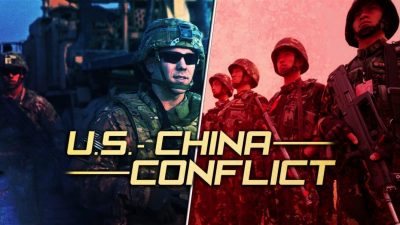Western Intellectuals Freak Over ‘Frankenstein’ China
… while academics in Beijing plot decoupling business with the US and teaming up with EU and ASEAN

Western economists and intellectuals obsessed with demonization of China are never shy of shortcuts glaringly exposing their ignorance.
The latest outburst posits that “we” – as in Western intellectuals – “are the modern version of Mary Shelley’s Frankenstein,” who electro-shocked a dead body (China) into a resurrected “murderous monster.”
So, welcome to the Sino-Frankenstein school of international relations. What next? A black and white remake with Xi Jinping playing the monster? Anyway, “we” – as in mankind’s best hope – should “avoid carrying on in the role of Frankenstein.”
The author is an economics professor emeritus at Harvard. He cannot even identify who’s to blame for Frankenstein – the West or the Chinese. That says much about Harvard’s academic standards.
Now, compare this with what was being discussed at a trade war symposium at Renmin University in Beijing this past Saturday.
Chinese intellectuals were trying to frame the current geopolitical dislocation provoked by the Trump administration’s trade war – without naming it for what it is: a Frankenstein gambit.
Li Xiangyang, director of the National Institute of International Strategy, a think tank linked to the Chinese Academy of Social Sciences, stressed that an “economic decoupling” of the US from China is “completely possible,” considering that “the ultimate [US] target is to contain China’s rise … This is a life-or-death game” for the United States.
Decoupling
Assuming the decoupling would take place, that could be easily perceived as “strategic blackmail” imposed by the Trump administration. Yet what the Trump administration wants is not exactly what the US establishment wants – as shown by an open letter to Trump signed by scores of academics, foreign policy experts and business leaders who are worried that “decoupling” China from the global economy – as if Washington could actually pull off such an impossibility – would generate massive blowback.
What may actually happen in terms of a US-China “decoupling” is what Beijing is already, actively working on: extending trade partnerships with the EU and across the Global South.
And that will lead, according to Li, to the Chinese leadership offering deeper and wider market access to its partners. This will soon be the case with the EU, as discussed in Brussels in the spring.
Sun Jie, a researcher at the Institute of World Economics and Politics at the Chinese Academy of Social Sciences, said that deepening partnerships with the Association of Southeast Asian Nations (Asean) will be essential in case a decoupling is in the cards.
For his part Liu Qing, an economics professor at Renmin University, stressed the need for top international relations management, dealing with everyone from Europe to the Global South, to prevent their companies from replacing Chinese companies in selected global supply chains.
And Wang Xiaosong, an economics professor at Renmin University, emphasized that a concerted Chinese strategic approach in dealing with Washington is absolutely paramount.
All about Belt and Road
A few optimists among Western intellectuals would rather characterize what is going on as a vibrant debate between proponents of “restraint” and “offshore balancing” and proponents of “liberal hegemony”. In fact, it’s actually a firefight.
Among the Western intellectuals singled out by the puzzled Frankenstein guy, it is virtually impossible to find another voice of reason to match Martin Jacques, now a senior fellow at Cambridge University. When China Rules the World, his hefty tome published 10 years ago, still leaps out of an editorial wasteland of almost uniformly dull publications by so-called Western “experts” on China.
Jacques has understood that now it’s all about the New Silk Roads, or Belt and Road Initiative:
“BRI has the potential to offer another kind of world, another set of values, another set of imperatives, another way of organizing, another set of institutions, another set of relationships.”
Belt and Road, adds Jacques, “offers an alternative to the existing international order. The present international order was designed by and still essentially privileges the rich world, which represents only 15% of the world’s population. BRI, on the other hand, is addressing at least two-thirds of the world’s population. This is extraordinarily important for this moment in history.”
In fact, we are already entering a Belt and Road 2.0 scenario – defined by Minister of Foreign Affairs Wang Yi as a “high-quality” shift from “big freehand” to “fine brushwork.”
At the Belt and Road Forum this past spring in Beijing, 131 nations were represented, engaged in linked projects. Belt and Road is partnering with 29 international organizations from the World Bank to APEC, the Asia Pacific Economic Cooperation.
Apart from the fact that Belt and Road is now configured as a vast, unique, Eurasia-wide infrastructure and trade development project extending all the way to Africa and Latin America, Beijing is now emphasizing that it’s also a portmanteau brand encompassing bilateral trade relations, South-South cooperation and UN-endorsed sustainable development goals.
China’s trade with Belt and Road-linked nations reached $617.5 billion in the first half of 2019 – up 9.7% year-on-year and outpacing the growth rate of China’s total trade.
Chinese scholar Wang Jisi was right from the start when he singled out Belt and Road as a “strategic necessity” to counter Barack Obama’s now-defunct “pivot to Asia”.
So now it’s time for Western intellectuals to engage on a freak-out: as it stands, Belt and Road is the new Frankenstein.
*
Note to readers: please click the share buttons above or below. Forward this article to your email lists. Crosspost on your blog site, internet forums. etc.
This article was originally published on Asia Times.

